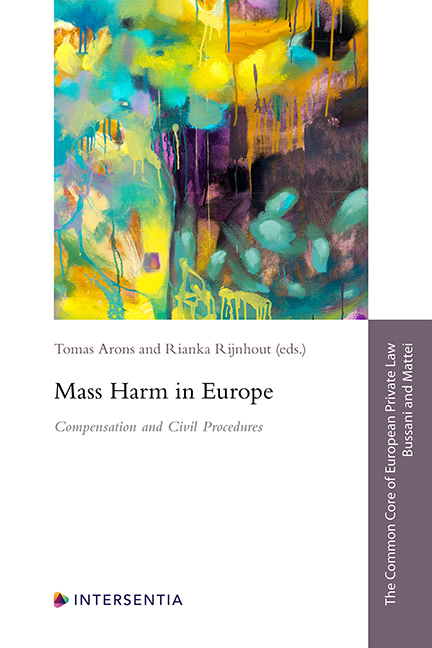Case 10: Damage To Environment and Fear of a Future Illness
Published online by Cambridge University Press: 03 April 2024
Summary
CASE
A fire at a chemical factory caused an ecological disaster: tons of toxic chemicals are released into in a river and cause the spread of poisonous fumes. Residents were told by government officials to stay indoors. Several people, who inhaled the fumes, were treated at hospital. They were not to blame for inhaling the fumes. They did not contract an illness, disorder or suffer injury, but a risk exists that they will get ill in the future. The local environment suffered severely from the toxic spill. Plants, fish and other organisms died or became ill. Research showed that the factory infringed the licensing requirements regarding the destroying of the chemical substances.
A group of those who inhaled the fumes demand compensation from the factory out of fear of becoming ill in the future. In addition, an environmental organisation files a claim for compensation for damage caused to the environment as such. Will they receive compensation and, if so, for what losses? And is it possible to start a collective proceeding? If so, please indicate the most important bottlenecks in this particular case.
DISCUSSIONS
AUSTRIA
Matthias Dangl and Georg E Kodek
Operative Rules
As the people who inhaled the fumes have not suffered any health damages yet, there is no basis to demand compensation. However, they can bring a declaratory action in order to determine the liability of the factory for future damages (§ 228 ACCP). Since claims for declaratory judgments cannot be assigned under Austrian case law, there is no possibility for the Austrian model of class action.
As far as the environmental damage is concerned, the case is dealt with by public law (Bundes-Umwelthaft ungsgesetz).
Legal Formants
Bringing a declaratory action is necessary to prevent the claims from becoming time barred. Furthermore, it helps to avoid difficulties in providing evidence at a later stage.
The district administrative authority will place the factory under an obligation to take redevelopment measures. Environmental organisations are entitled to request the authority to take action (§ 11 para 1 of the Bundes-Umwelthaft ungsgesetz).
BELGIUM
Artuur Keukeleire, Larissa Vanhooff and Britt Weyts
Operative Rules
The compensation that ‘victims’ of the toxic fumes could demand is so-called fear damage, based on the fault-based general tort law.
- Type
- Chapter
- Information
- Mass Harm in EuropeCompensation and Civil Procedures, pp. 385 - 408Publisher: IntersentiaPrint publication year: 2023

